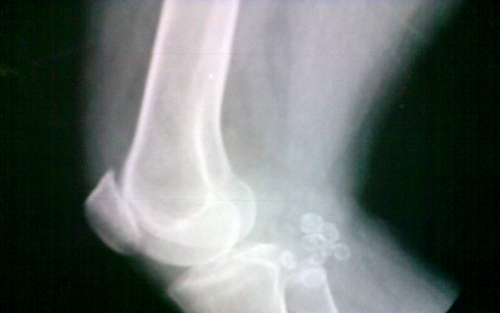16 December 2016. An early clinical trial testing implants of a person’s stem cells to repair damaged knee cartilage in younger adults returned largely favorable results. A report of the study, conducted by Azellon Cell Therapeutics, a spin-off enterprise from the universities of Liverpool and Bristol in the U.K., appears in the 15 December issue of the journal Stem Cells Translational Medicine.
The clinical trial tested a prototype product called the cell bandage, developed by Azellon, a company founded by stem cell biologist Anthony Hollander at University of Liverpool with colleagues from University of Bristol and affiliated hospitals. The company is taking to market the technology developed by Hollander underlying the cell bandage that repairs tears in the meniscus, a layer of cartilage in joints connecting bones to joints.
Torn meniscus cartilage in the knee is a common injury in contact sports like American football and rugby which, depending in its extent and severity, may be repaired, but is often removed. If removed, the knee faces a higher risk of developing osteoarthritis, a condition that may require knee replacement surgery after a few years.
The cell bandage technology developed by Hollander and tested in the trial takes adult mesenchymal or skeletal stem cells in a biopsy from the individual’s bone marrow and grows the number of cells needed to fill a collagen scaffold membrane. The stem cells are then seeded on the membrane, surgically implanted over the tear, and attached to the remaining cartilage in the knee.
In the clinical study led by Hollander, 5 individuals age 18 to 45 with torn meniscus cartilage were implanted with Azellon’s cell bandage at Southmead Hospital in Bristol. The trial’s main objective was to test the safety of the procedure, and no adverse events were reported in the 2 years following the implants. The study also assessed the effectiveness of the cell bandages, and after 12 months, all of the participants had intact meniscus cartilage in the repaired knees.
The study team followed the 5 individuals for another year, where mixed results were returned. After the second year, 3 of the trial participants reported full functionality returning in their knees. The other 2 individuals, however, either tore their knee cartilage again, requiring surgical removal, or reported no further healing.
The team still considers the results favorable enough to prove the technology’s concept. “The cell bandage trial results,” says Hollander in a university statement, “are very encouraging and offer a potential alternative to surgical removal that will repair the damaged tissue and restore full knee function.” He adds that, “We are currently developing an enhanced version of the cell bandage using donor stem cells, which will reduce the cost of the procedure and remove the need for two operations.”
Read more:
- Start-Up Reprogramming Stem Cells to Treat Heart Failure
- Trial Testing Retina Cell Implants for Glaucoma
- Material Developed for 3-D Printed Bone
- Lung Tissue Grown in Lab from Stem Cells
- Stem Cells, Gene Therapy Produce Replacement Joint Cartilage
* * *


 RSS - Posts
RSS - Posts
[…] Trial Testing Stem-Cell Implant for Cartilage Repair […]